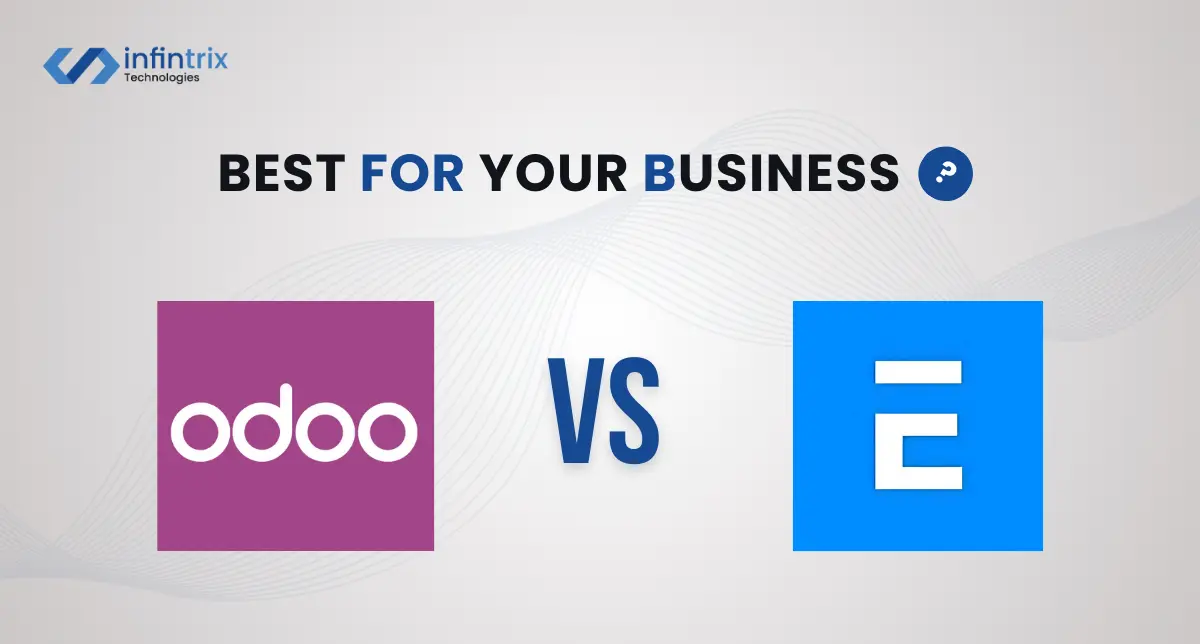When companies start looking for a new ERP system, two names keep coming up: ERPNext vs Odoo. Both are powerful open-source ERP platforms that promise flexibility, scalability, and cost savings compared to big enterprise options. But which one actually fits your business best?
This guide breaks down an Odoo vs ERPNext comparison in detail. We’ll look at features, pricing, customization, support, and real-world use cases. Think of it as a comprehensive comparison designed to help you make a confident decision when choosing the right ERP solution for your business.
What is ERPNext?
ERPNext is a free and open-source designed for businesses that need a practical, affordable enterprise resource planning. Built on the Frappe Framework, it covers accounting, HR, CRM, projects, inventory, and more—all in a single package.
Unlike modular ERPs, ERPNext offers most tools upfront. That means you don’t need to add separate apps just to manage payroll or inventory management. This makes it appealing to businesses that want a clean, all-in-one ERP software without the complexity of dozens of add-ons.
- Open-source ERP system with no license costs
- Strong focus on SMEs and startups
- Covers core ERP functionality in one package
Key Features of ERPNext
ERPNext offers built-in modules for CRM, accounting, HR, payroll, inventory, and manufacturing. Its flexibility makes it useful for both service-based and product-based companies. For example, a retailer can manage stock while a services firm tracks projects and billing under one roof.
Ideal Use Cases for ERPNext
ERPNext is designed for small and medium-sized businesses looking for an essential ERP. Startups love it because the community edition is free, and manufacturers value its strong production planning module. ERPNext also works well for companies that want more control over their ERP implementation.
What is Odoo?
Odoo is another popular open-source ERP system, but it takes a modular approach. Instead of giving you everything at once, Odoo lets you choose from hundreds of apps—like sales, CRM, accounting, Odoo Studio, or eCommerce—and scale as your business grows.
Odoo provides two versions: Odoo Community and Odoo Enterprise. The community version is free, while the Odoo Enterprise Edition includes advanced features, support, and cloud hosting. This flexibility makes Odoo attractive for businesses that want to grow step by step.
- Over 30 core apps and 16,000+ in the Odoo App Store
- Flexible pricing depending on modules and users
- Odoo partners worldwide for support and deployment
Key Features of Odoo
Odoo offers apps for sales, CRM, accounting, HR, manufacturing, inventory, and eCommerce. It’s easy to expand—add apps as you need them. For example, a small business might start with invoicing, then later add eCommerce and marketing modules as it scales.
Ideal Use Cases for Odoo
Most businesses in retail, e-commerce, and services find Odoo appealing. It’s also widely used by growing enterprises that value scalability. If your company expects rapid growth, choosing Odoo allows you to expand smoothly without migrating to a new ERP later.
Odoo vs ERPNext: Feature-by-Feature Comparison
When it comes to an ERP comparison, the best way to evaluate is side by side. Both cover accounting, sales, HR, and inventory, but their design philosophies differ. ERPNext takes an “all-in-one” approach, while Odoo builds around modular flexibility.
Here’s a quick comparison table to make things easier:
| Feature | ERPNext | Odoo |
| Core Modules | Built-in: accounting, HR, CRM, payroll, projects, inventory | Choose apps: sales, CRM, eCommerce, accounting, HR |
| Customization | Strong for developers via Frappe Framework | High flexibility with Odoo Studio and apps |
| Interface | Simple, less polished | Modern, user-friendly |
| Integrations | Smaller ecosystem | Huge Odoo App Store |
| Scalability | Best for SMEs/startups | Strong for growing enterprises |
Core Business Modules
Both platforms cover the basics like CRM, accounting, HR, sales, and inventory management, and also include manufacturing and project management by default, whereas Odoo lets you add modules only when needed. That said, Odoo has more depth in areas like e-commerce and marketing automation.
Customization & Flexibility
ERPNext customization is handled through the Frappe Framework, which is great for tech-savvy teams. Odoo, however, shines with Odoo Studio—a drag-and-drop builder that lets non-developers tweak workflows, fields, and dashboards. This makes Odoo more accessible for businesses without in-house developers.
User Experience & Interface
When you compare Odoo and ERPNext, Odoo wins on the user interface. It’s sleek, modern, and easy for first-time users. ERPNext is simpler but less polished, which may feel dated to teams used to modern SaaS platforms. The tradeoff? ERPNext’s simplicity often means fewer distractions.
Integrations & Ecosystem
Here’s where Odoo has a clear edge. With a large and active community plus thousands of apps in the Odoo App Store, it integrates with countless third-party tools. ERPNext supports integrations but has a smaller ecosystem, which may limit options for U.S. businesses relying heavily on external apps.
Pricing Comparison: Odoo vs ERPNext
Pricing can make or break an ERP decision. The Odoo and ERPNext offerings differ significantly here. ERPNext is free to use if self-hosted, while Odoo charges per user and per app. That said, both may involve hidden costs for hosting, customization, and support.
For U.S. businesses, the total cost depends on whether you choose cloud hosting, on-premises deployment, or managed services. Always budget beyond the sticker price—training, support, and consulting fees add up.
ERPNext Pricing Model
The community edition is free, making it attractive for startups. Paid versions come with managed hosting and support, still keeping it an affordable ERP. However, customization or third-party implementation partners can add to costs.
Odoo Pricing Model
Odoo also uses a per-user, per-app model. With Odoo Online and the Enterprise version, costs scale quickly as you add users and modules. This flexibility is powerful but can surprise businesses with escalating fees if they don’t plan.
Cost of Implementation & Customization
Both ERPs may involve costs beyond licensing. Think setup, training, consulting, and third-party integrations. Odoo often requires more spending on apps, while ERPNext may require more developer time. Either way, budget carefully before choosing between Odoo and ERPNext.
Deployment & Hosting Options
Deployment flexibility matters when selecting an ERP solution for your business. The good news? Both provide multiple hosting choices, from self-hosted to cloud-based. Which works best often depends on your IT team’s skills and budget.
ERPNext shines with easy self-hosted deployment for developers, while Odoo’s polished cloud options make it attractive for non-technical teams. Here’s the key takeaway: ERPNext gives more control, Odoo gives more convenience.
ERPNext Deployment Options
The supports self-hosting, third-party cloud hosting, and managed services. It works well for teams that want to customize deeply and have in-house IT staff ready to handle updates.
Odoo Deployment Options
Odoo offers options like Odoo Online, Odoo.sh, self-hosting, or external hosting providers. Using Odoo Online is the simplest route, but larger businesses often pick the Enterprise Edition for full flexibility.
Community, Support, and Ecosystem
Long-term success with an ERP system often depends on its community support and partner ecosystem. Both have strong communities, but Odoo has a larger global footprint, which means more partners and more apps.
For U.S. businesses, this can be a deciding factor. An ERP with a large community offers faster troubleshooting, more documentation, and better long-term sustainability.
ERPNext Community & Support
ERPNext has an active community with forums, GitHub, and documentation. It’s backed by Frappe Technologies and regional partners. However, compared to Odoo, the ecosystem is smaller, which may limit advanced integration and third-party options.
Odoo Community & Support
Odoo has a large and active community plus a strong partner network worldwide. With Odoo Community and Enterprise, businesses can choose free or paid support. The Odoo App Store also adds thousands of third-party extensions, making it easier to expand functionality.
ERPNext vs Odoo: Pros and Cons
Every ERP comes with trade-offs. A detailed comparison of strengths and weaknesses helps businesses determine which ERP fits best. The differences between them often boil down to ecosystem size, cost, and scalability.
Here’s a simple breakdown:
Advantages of ERPNext
Supports startups and SMEs with an affordable ERP option. Being a free and open-source ERP, it reduces upfront costs. It also comes with strong modules for accounting, HR, and manufacturing built in, without extra fees.
Limitations of ERPNext
The downside is a smaller ecosystem and fewer third-party integrations. Compared to Odoo, ERPNext has less adoption in large enterprises, which can mean fewer specialized partners and less variety in integrations.
Advantages of Odoo
Odoo ERP has a large global user base and thousands of apps in the Odoo Store. Its modular approach lets businesses scale smoothly. Odoo Enterprise Edition also provides advanced features and hosting options for bigger companies.
Limitations of Odoo
The biggest challenge is cost. Since Odoo uses per-user, per-app pricing, fees can escalate quickly. Too many modules may also complicate workflows, especially for businesses that want simplicity.
Choosing Between ERPNext and Odoo
When choosing an ERP, the decision should come down to company size, industry, budget, and long-term goals. Both offer powerful ERP solutions, but their strengths lie in different areas.
Here are a few factors to consider when choosing between them:
- Company size and growth plans
- Budget for software and implementation
- Industry-specific ERP requirements
- Internal IT expertise for customization
Best Fit for SMEs vs Enterprises
ERPNext is often the best ERP softwares for startups and SMEs looking for a free and open-source ERP solution. Odoo, on the other hand, scales better for mid-sized and large companies that need a powerful ERP with extensive modules.
Industry-Specific Considerations
Manufacturers benefit from ERPNext’s built-in modules. Retailers and e-commerce firms usually choose Odoo for its strong online and sales integrations. Service providers can use either, depending on their budget and customization needs.
Budget & Resource Considerations
If you need an affordable ERP and have in-house IT talent, ERPNext to help customize may be ideal. If you prefer convenience and modular growth, Odoo—despite higher costs—fits better. Always factor in long-term expenses, not just the starting price.
Alternatives to ERPNext and Odoo
While ERPNext and Odoo are two leading ERP solutions, they aren’t the only choices. Businesses may also look at:
- SAP Business One – strong enterprise ERP
- NetSuite – cloud-based ERP for larger companies
- Zoho ERP – good for small and medium-sized businesses
Exploring alternatives helps with ERP selection, especially if you need industry-specific features not covered by them.
FAQs on ERPNext vs Odoo
Answering common questions helps clear doubts when selecting an ERP system. Here’s a quick comparison of FAQs businesses often ask.
Which is easier to use: ERPNext or Odoo?
When you compare, Odoo’s interface is sleeker and easier for new users. ERPNext is simpler but may feel less modern.
Is ERPNext really free?
Yes. The community edition is free, making it a free and open-source ERP. Paid options cover hosting and support.
Can ERPNext and Odoo be migrated from one to the other?
Migration is possible but can be complex. Differences in database design, customization, and workflows make it a time-intensive process.
Which ERP is better for startups?
ERPNext is often the go-to for startups thanks to its community edition and built-in modules. That said, startups planning fast growth may start using Odoo for its scalability.
Conclusion: ERPNext vs Odoo – Which Should You Choose?
Both provide strong, open-source ERP platforms. ERPNext is ideal for smaller businesses needing an affordable ERP, while Odoo shines for companies that value scalability and an extensive ecosystem.
Here’s the key takeaway: the right ERP solution depends on your business size, budget, and growth strategy, basically, your business requirements. Instead of asking “Which is better?”, focus on determining whether ERP aligns with your goals today and supports your vision for tomorrow. Infintrix is the smart solution provider of both Odoo and ERPNext ERP solutions for every business size, from small to large businesses. If you want to implement an ERP, book a free demo now for the right solution!

